Most parents would probably agree that baby wipes are a must-have baby product! There are just so many benefits to using disposable wipes. They’re super convenient; you can simply grab a wipe and wipe your baby during a diaper change or even wipe their hands and mouth while on the go. Baby wipes are also pretty affordable and a product that parents like to use.
But are you wondering what the best non-toxic baby wipes are these days? Like, which baby wipes are actually safe for your baby? This is a great question and you’re definitely not alone in wanting the products you use on your baby to be safe for teheir health and development.
You might be surprised to find harsh chemicals on the ingredients list of almost every single brand of baby wipes. Seriously. Turn over nearly any package of baby wipes and scan the ingredients list. Most contain a chemical soup containing harsh chemicals, preservatives, and synthetic fragrances that don’t belong anywhere near a baby.
Since baby wipes are used on a daily basis and make direct contact with your baby’s skin (their largest organ) several times a day. And given that any products that you use on your baby’s skin can be absorbed into their bloodstream, it’s absolutely crucial to choose natural and non-toxic baby wipes that are made with healthy and safe ingredients.
In this article, we’ll teach you how to choose the most natural and the best non-toxic baby wipes for your baby. We know it can be totally overwhelming trying to decode all of those ingredients on a label, but we’ve done all the research for you. And spoiler alert: very few brands actually meet our standards. This list is short on purpose.
Top Picks
- Purest baby wipes: Water Wipes Original Baby Wipes
- Bests dry baby wipes: Honest Company Organic Dry Wipes
- Best natural baby wipes: Jackson Reece Unscented Wipes
- Best for wiping hands and faces on the go: Water Wipes Soapberry Wipes
What Ingredients Should You Avoid in Baby Wipes?
Let’s go over which chemicals to avoid in baby wipes and explore a few safer alternatives to mainstream baby wipes to help you choose the most natural baby wipes brand for your precious baby.
When choosing a brand of baby wipes, it’s so important that you select a brand that contains as few ingredients as possible, uses no fragrance, and minimizes its use of synthetic preservatives (they should be the very last ingredients on the list). Some brands contain several essential oils, which are unnecessary and unsafe to use on babies.
Here are some of the most common toxic chemicals found in baby wipes. AVOID these completely if you see them in baby wipes!
- Synthetic fragrance or “parfum”. Fragrance of any kind is unnecessary in baby wipes. Why would they even need to be scented? And when companies go as far as to simply list “fragrance” on their ingredients list, they are taking advantage of a loophole in the law that enables them to avoid disclosing ingredients, including synthetic ingredients, parabens, and phthalates. This nondescript “fragrance” ingredient can contain chemicals that the company doesn’t need to disclose, including chemicals that can be endocrine disruptors. When you see “fragrance” on any label, you should not use that product. This is because a loophole in the law allows companies to protect their “trade secrets” without actually disclosing what is in their fragrance. A product label that uses “fragrance” or “parfum” is always hiding something. Please avoid “fragrance” without exception – for products that you buy for your baby and yourself.
- Phenoxyethanol. While often used in place of parabens, phenoxyethanol is believed to be a safer synthetic preservative; however, when it comes to infant exposure, it has been associated with skin irritation such as eczema and affecting nervous system function. For these reasons, it’s best to avoid in baby products whenever possible. Even a lot of natural and “sensitive” baby wipes contain this preservative.
- Sodium Benzoate. A synthetic preservative that is used in high concentrations in a lot of baby wipe formulas, sodium benzoate can cause organ system toxicity. When combined with citric acid at high enough concentrations, sodium benzoate can be carcinogenic.
- Polysorbate 20. This chemical is often treated with ethylene oxide which can be contaminated with potentially dangerous by-products known to cause skin reactions and allergies. Polysorbate 20 is also known to cross the blood-brain barrier and is generally speaking, very toxic.
- Parabens. Parabens are preservatives known to cause allergic skin reactions and rashes. They are also linked to infertility as well as cancer and hormonal disruption. This applies to any ingredient ending in “paraben”, including isobutylparaben, propylparaben, butylparaben, ethylparaben, and methylparaben.
- Synthetic fabrics. It’s also smart to consider environmental impact when choosing a baby wipe. Baby wipes are one of the biggest sources of non-biodegradable waste in our landfills; wipes made with synthetic fabrics like polyester also release microplastics in the environment. The best option are biodegradable wipes made from materials such as cotton or bamboo.
- Essential oils. Similarly, essential oils are powerful and potent, and their quality and purity is a big factor. A baby’s system is just developing and doesn’t need to be exposed to numerous essential oils. For the most part, it’s best to avoid essential oils around children, except under the direction of a professional. Baby products that integrate numerous essential oils are irresponsibly designed, in my opinion.
- Formaldehyde-releasing agents. Formaldehyde and formaldehyde-releasing agents have been found in baby wipes in recent years. Formaldehyde has been linked to cancer and several short-term health hazards such as skin irritation and allergic reactions.
- Propylene glycol and other petroleum-based ingredients. Petroleum-based wipe solutions need to be avoided because they can be contaminated and/or lead to skin irritations and other health concerns.
And this is only a short list of troublesome ingredients found in popular disposable baby wipes. What’s also important to remember is that some of these potentially toxic chemicals are hidden ingredients that will not be clearly labeled on packages.
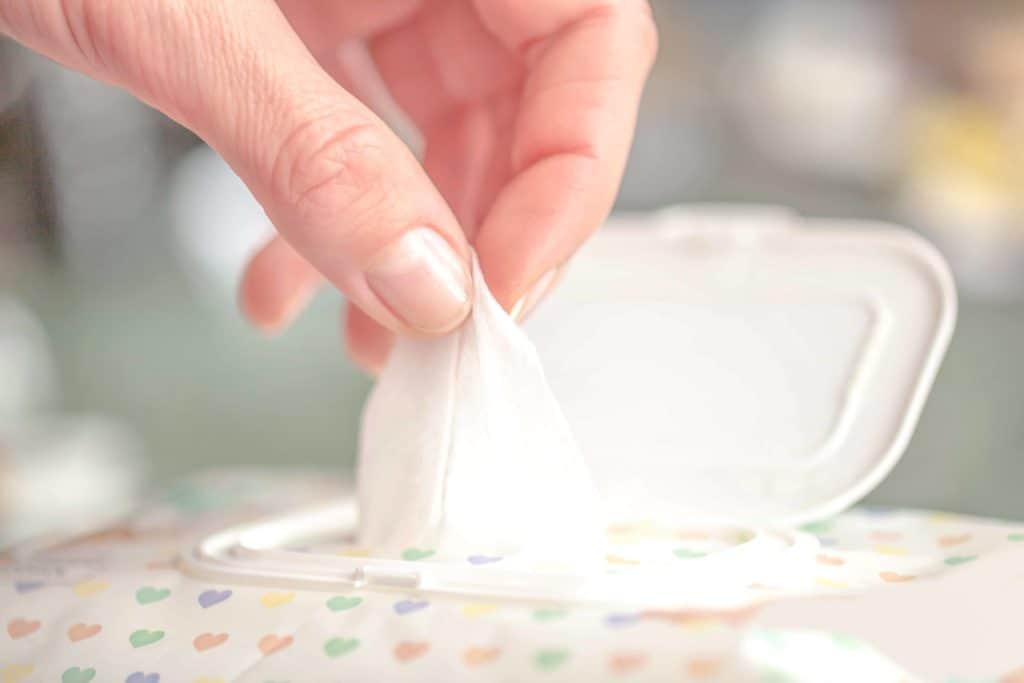
Choosing the Best Baby Wipes
When it comes to non-toxic baby wipes, there are a few things you should look for. First, make sure that the wipes are free of harmful chemicals. Many conventional brands use toxic ingredients like artificial fragrances, parabens, and phthalates. These substances can cause skin irritation and other health problems. Second, choose wipes that are made with natural ingredients. This will help to reduce the risk of skin irritation and other adverse reactions. Finally, make sure that the wipes are hypoallergenic. This will ensure that they’re gentle on your baby’s delicate skin.
When trying to find the best baby wipes for you, consider the following:
- Price. This is an important factor in choosing which brand of baby wipes you’ll use. Save money on baby wipes by joining Amazon Prime (use this link for a free 30-day trial) and adding your favorite brand of baby wipes to your monthly subscription.
- Thickness and packaging. Thin wipes won’t get the job done, so thickness and feel are an important factor. Similarly, flimsy packaging can make it difficult to remove a wipe from the container.
- Availability. Do you prefer to order baby wipes online, or would you like to be able to pick them up locally? Once you’ve committed to a brand of wipes, have them sent to you monthly through Amazon’s Subscribe & Save program. That way, you won’t have to worry about keeping baby wipes in stock at home (and you can always skip a delivery if needed).
- Your baby’s needs. Is your baby sensitive? Do they get diaper rashes? Do they have any specific allergies? Consider these needs when choosing the best baby wipes for your little one.
- Ingredients. As outlined above, the ingredients used in baby wipes are very important because the wipes are applied directly to your baby’s skin — often multiple times a day. Choose a brand that you feel comfortable with from the list below.
The Best Non-Toxic Baby Wipes (Reviews)
Here are the best non-toxic baby wipes based on ingredients, chemical safety, convenience, and overall feel and efficacy. Based on our review methodology, these are the safest baby wipes on the market today.
1) WaterWipes Sensitive Baby Wipes
Buy on Amazon | Target | BuyBuy BABY
Water Wipes still tops our list of the best non-toxic baby wipes because of their minimal ingredients: water and a drop of grapefruit seed extract. But we want you to know that grapefruit seed extract can commonly contain incidental ingredients such as methylparaben and triclosan, which are exactly the kind of harmful chemicals we are trying to avoid.
However, the Water Wipes manufacturer tests their grapefruit seed extract and has disclosed that it contains a trace amount of benzalkonium chloride, roughly 0.002%. Given how clean the wipes are otherwise (in comparison to other options available on the market), we still recommend Water Wipes without hesitation. And we’ll still consider them one of the purest baby wipes on the market.
Why? Because of the minimal ingredients they use. Just as how grapefruit seed extract can contain incidental ingredients, so can all of the other ingredients in any baby wipes. Some of the wipes on the market contain 8-10 ingredients alone, meaning there can be hidden or incidental ingredients in any of those ingredients. We like the simplicity of Water Wipes, period. And the company’s transparency.
Water Wipes has also made some important upgrades: they’re now plastic-free and biodegradable (they were previously polyester fabric). But, by switching over to biodegradable wipes, the wipes do have a slightly different scent that’s almost chlorine-like. It’s pretty subtle but it’s definitely a marked change from the old formulation.
Another great thing about Water Wipes is that they have the National Eczema Association Seal of Acceptance. Overall, Water Wipes are a great option for a more natural wet baby wipe.
2) Jackson Reece Unscented Baby Wipes
Jackson Reece’s unscented baby wipes formulation is also a great option to consider when you’re looking for natural baby wipes. Over 99% of the ingredients are made from vegetable and plant extracts, though it does contain sodium benzoate (listed as the fourth-to-last ingredient).
A UK-based company, Jackson Reece Baby Wipes are completely plastic-free and biodegradable. As with other baby wipes we recommend, these do not have any alcohol or fragrance ingredients, so they are perfectly pH balanced, hypoallergenic, and great for any babies who suffer from eczema. The ingredients are really very simple – made of wood pulp, Aloe Vera, purified water, and vegetable preservatives. We love Jackson Reece wipes!
3) Honest Company Organic Dry Wipes
Buy on Amazon | Honest Co. | Target | Walmart
Looking for chemical-free baby wipes? This is your best bet.
If you’re open to using a dry baby wipe, The Honest Company’s organic cotton dry wipes are a perfect option. Use them at home or on the go with just water in a spray bottle, a drop of jojoba oil, or a DIY wipes solution. Because they’re made with organic cotton, these can run a little pricey but they are truly one of the most natural and non-toxic options available.
4) Water Wipes Soapberry Baby Wipes
Buy on Amazon
Do you wonder how to clean your baby’s hands at the park or on the go when there isn’t a restroom nearby? Water Wipes Soapberry Wipes are a good option for cleaning baby’s hands and mouth on the go. Pack these in your diaper bag for a day at the park, at the zoo, or just on the go.
Soapberry is a berry-like fruit that has natural soap-like effect, which is why we love that Water Wipes has included this ingredient in their textured wipes. We don’t necessarily recommend using these for diapering, though they are supposedly gentle enough to be used on a baby’s bottom.
These wipes are great for babies and toddlers (and the whole family too!).
5) Pipette Baby Wipes
Buy on Amazon | Pipette Baby
Pipette baby wipes contain several beneficial ingredients such as squalane, apple fruit extract, and decyl glucoside (a mild cleanser). These wipes make the list, but please note that they contain sodium benzoate, potassium sorbate, and citric acid as some of the final ingredients in the list.
Overall, these wipes are a good and safe choice, but please note that some reviews indicate they’ve had trouble getting the wipes out of the package. The company suggests a little workaround: open the wipes cover and make a small cut at the sides; this should help with this problem!
6) Ecoriginals Baby Wipes
Buy on Amazon
Ecoriginals is a wonderful baby brand that makes non-toxic diapers and great non-toxic baby wipes as well. Made in New Zealand with bamboo fiber and pure ingredients, Ecoriginals wipes are a great and more natural baby wipe to consider.
One of the ingredients, Japanese soybean amino acid, often contains its own set of preservatives (sodium benzoate and potassium sorbate), so please keep that in mind when considering this brand.
Their baby wipes come in three versions:
- Original, water-based wipes: This is a simple formulation made with purified New Zealand pure water, Japanese soybean amino acid, certified organic aloe vera extract, German chamomile essential oil, and vitamin E.
- Manuka honey wipes: These contain Manuka honey, which is an anti-inflammatory and anti-bacterial ingredient.
- Goat milk wipes: These contain added goat milk to nourish and soothe your baby’s skin.
If you’re not sure which version to buy, you can also try a wipes sampler pack on Amazon to try each of the three formulations and see which one you prefer.
7) Abby & Finn Wipes
Buy on Amazon
Abby & Finn makes quality baby wipes with just a few simple ingredients. They contain 99% water and only three additional ingredients: soybean amino acids, organic aloe vera, and natural vitamin E.
8) Wild & Pure Dry Wipes
Buy on Wild & Pure
The lovely folks at Wild & Pure have offered our readers a 10% discount. Use code GENTLE to save on your purchase.
Another great option for natural baby wipes is Wild & Pure, made with 100% cotton. If you’re looking for a more sustainable wipe, this is for you. These dry wipes are made with 50% repurposed cotton scrap and 50% unbleached USA-grown cotton and they can be machine-washed (once) and reused.
The starter set comes with a package of dry wipes along with a bottle of their soap concentrate (which is made with organic ingredients), a glass dispenser, and a travel squeeze dispenser. You can simply dilute the concentrate in the glass dispenser and keep that handy on your baby’s changing table. Then, when it’s time to change a diaper, simply spray the concentrate onto the dry wipe and wipe away.
Unlike the Honest dry wipes, these aren’t organic but we do love that they come with a soap concentrate and spray bottle. If you’re looking for a dry wipe and you’re trying to choose between the two, the choice just comes down to your personal preference. We also like that they offer an easy subscription option for wipes refills.
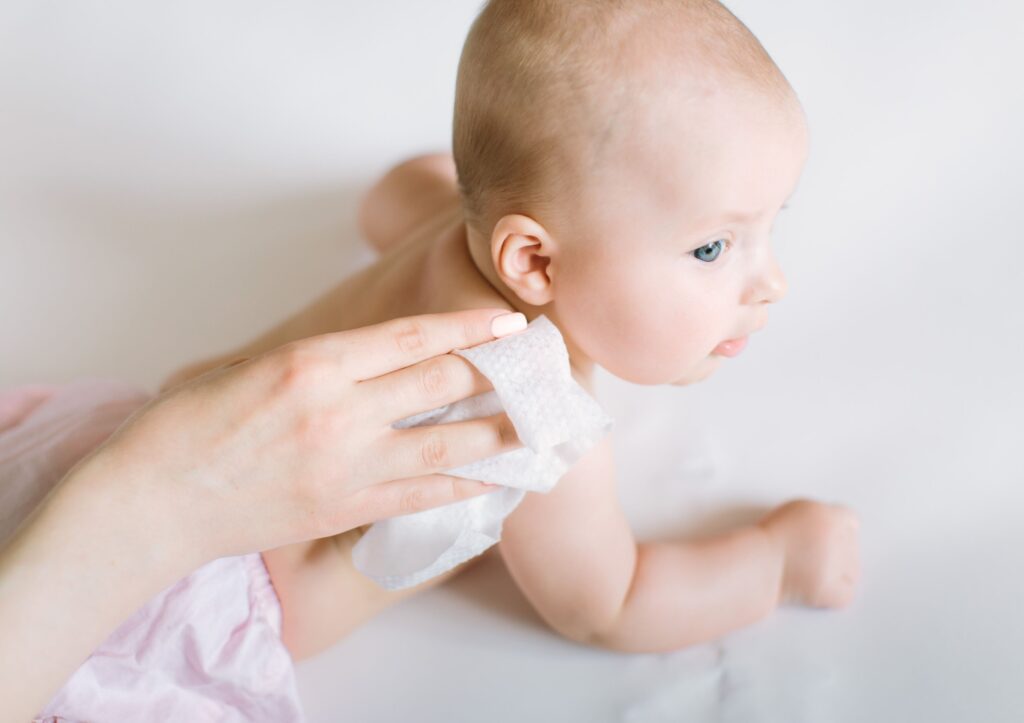
The “OK” List
- Bets & Emy Baby Wipes: Technically, these wipes would be on our main list of best baby wipes, but they’ve been out of stock for several months at the time of writing this article. Just like Water Wipes, the ingredients are simple and we definitely appreciate simplicity! They’re made with just water and a drop of fruit extract.
- Bloom Baby Wipes: We have mixed feelings about this brand of baby wipes. The ingredients are OK, but it would definitely not be recommended for a sensitive baby or a baby with eczema.
- Caboo Tree-Free Baby Wipes: This company seems to be relatively transparent and we appreciate the mostly clean ingredients used in their baby wipes. These wipes are free of phthalates, alcohol, chlorine, and formaldehyde, making them an OK option. The only hesitation we have is regarding the sodium benzoate, but wipes do require a preservation system or they would go moldy.
- Doctor Butler’s Organic Baby Wipes: This wipes formulation looks really promising, and the only possible ingredient of possible concern is rosemary extract oil, which is added for freshness. While this is likely not a major concern because it isn’t the same as rosemary essential oil, we’re being cautious by not including it in our list of best baby wipes.
- Eco by Naty Unscented Baby Wipes: We’ve rated their diapers high on our list of non-toxic diapers, but their baby wipes slightly miss the mark with ingredients like propanediol, sodium. benzoate, and potassium sorbate. These are compostable, but we wish they’d simplify the ingredients.
- Eco Pea Co. Wipes: Aside from the combination of preservatives used, these wipes otherwise looked really good.
- Healthybaby/Healthynest: These baby wipes have a pretty clean ingredient profile, but they do use some ingredients of concern including citric acid and sodium benzoate, which could cause irritation in sensitive babies. While we aren’t necessarily convinced, there are concerns about Japanese honeysuckle (used in this product) containing natural compounds that mimic parabens. If you are worried about this, choose a different baby wipe from our list above.
- Honest Company Wipes: Most of the ingredients used in Honest wipes are perfectly fine and safe for babies, though some can be irritating for babies such as ethylhexyglycerin and sodium benzoate.
- Joonya Wipes: Unscented, biodegradable, made in New Zealand, Joonya wipes seem like a really good option, but they don’t make our “best” list because of two ingredients: citric acid (unknown source) and silver dihydrogen citrate. Silver dihydrogen contains ionic silver and citric acid, and there’s mixed data about the safety of this ingredient. Regular use of silver nanoparticles may have antibiotic-like effects and possibly contribute to antibiotic resistance. We’d use these sparingly and/or with caution.
- Made Of Baby Wipes: As with others on the “OK” list, Made Of wipes are mostly made with clean ingredients, but they do use citric acid, sodium benzoate, and potassium sorbate as preservatives.
- Millie Moon Sensitive Wipes: These wipes are phenoxyethanol-free and fragrance-free, which is great. But, they do contain citric acid and sodium benzoate, which may cause reactions or irritation in sensitive babies.
Baby Wipes to AVOID
These brands don’t meet my selection criteria, largely because they contain fragrances, unnecessary ingredients, or have preservatives listed as one of the main ingredients.
- Aleva Naturals: These wipes aren’t very natural at all; they’re just a chemical concoction. Avoid.
- All Clean Wipes: With PEG-40 hydrogenated castor oil, sodium benzoate, and disodium EDTA, these are a hard pass.
- Amazon Elements Baby Wipes: Avoid, avoid, avoid! The second ingredient on these baby wipes is phenoxyethanol, which means it contains a significant concentration (with respect to the formula) of this harsh and toxic preservative.
- Attitude Baby Wipes: The ingredients on this product aren’t great, including sodium benzoate and potassium sorbate listed very early in the ingredients list.
- Aveeno Fragrance-Free Baby Wipes: This product is just a chemical soup, with nearly nothing but various chemical ingredients.
- Babo Botanicals 3-in-1 Wipes: At first glance, these wipes looked great, although they do contain several herbal ingredients. But they contain several ingredients of concern, including natural fragrance (!), phenoxyethanol, potassium sorbate, and citric acid.
- Babyganics: We really wanted to like this product, because it contains a lot of good ingredients. But it contains a mash of preservatives, although they are the last few ingredients listed.
- Bambo Nature Wipes: These aren’t natural baby wipes in the least. Avoid.
- Bum Boosa Bamboo Wipes: It’s shocking to see this product recommended as much as it is, because it contains Polysorbate 20, Phenoxyethanol, Sodium Benzoate, and more.
- Burt’s Bees Baby: These wipes contain inflammatory ingredients and a host of ingredients. Avoid for these reasons.
- Coterie Baby Wipes: We like Coterie’s diapers, but as for their wipes, it’s hard to tell exactly which order their ingredients are listed. This formulation contains a total of three preservatives, and we’d prefer to see fewer in use.
- Cuties Complete Sensitive Wipes: These are promoted as being hypoallergenic, but they are best to be avoided for sensitive babies.
- DYPER Wipes: We like their diapers but the wipes formulation isn’t as great, with benzethonium chloride (high risk of allergies and irritation) and citric acid from an unknown source.
- Happy Little Camper Wipes: Nothing special in this formulation; it’s made with lots of chemicals and preservatives. There are better options.
- Hello Bello Baby Wipes: For a brand that touts itself as a clean and conscious company, their baby wipes really miss the mark. Sodium benzoate is listed as the third ingredient, along with ethylhexylglycerin. No thanks.
- Huggies Natural Care: Other than the aloe vera in these wipes, there’s likely nothing natural in the formulation. The second ingredient is phenoxyethanol, which is a major no.
- Little Toes Baby Wipes: This brand has been recommended a lot online but the formulation contains a lot of preservatives early on in the ingredients list (meaning they are some of the main ingredients) and for this reason is best avoided.
- Mama Bear Fragrance-Free Wipes: Another brand that disappoints when you turn the package over and look at the ingredients. While these are fragrance-free, they are not very natural.
- NATRACARE Organic Cotton Wipes: We love that these wipes are made with organic cotton, but they contain a number of unhealthy ingredients, including parfum (synthetic fragrance), potassium sorbate, maltodextrin, and more. Pass.
- Pampers Pure Baby Wipes: These wipes aren’t as pure as the name might suggest. With citric acid, sodium benzoate, disodium EDTA, and PEG-40 hydrogenated castor oil (which often has high risks of contamination), these wipes are a no go.
- Pampers Sensitive Wipes: For one of the best-selling baby products on Amazon, with over 140,000 reviews at the time of writing, the ingredients on this product are shockingly bad. This includes Citric Acid, Peg-40 Hydrogenated Castor Oil, Sodium Citrate, Phenoxyethanol, Ethylhexylglycerin, Benzyl Alcohol, Sodium Benzoate, and Bis-Peg/Ppg-16/16 Peg/Ppg-16/16 Dimethicone.
- Parent’s Choice Fragrance-Free Wipes: This contains some possibly allergenic ingredients, as well as sodium benzoate and citric acid from an unknown source.
- Seventh Generation Free & Clear Baby Wipes: This isn’t the worst option you could use, but it does contain a number of chemical ingredients including cocamidopropyl pg-dimonium chloride phosphate and sodium benzoate which may contribute to toxicity.
- Yugi Green Baby Biodegradable Wipes: Pass. These wipes contain three strong preservatives early in the ingredients list, indicating a higher concentration than in other wipes formulations. This is reason enough to pass.
- Young Living Seedlings Wipes: Great concept but this product contains far too many ingredients, including several essential oils. Babies have developing systems and should not be exposed to essential oils on a daily basis, especially topically. Extracts and hydrosols would be much safer.
Final Thoughts
We’ve established above that most baby wipes on the market aren’t perfect, but most parents agree that they’re a pretty essential baby item. Here’s how you can avoid exposing your baby to unnecessary chemicals, preservatives, and toxins from baby wipes:
- Avoid baby wipes with harmful ingredients. With some good options for natural baby wipes, there’s no reason to expose your baby to harsh chemicals by using other wipes that contain toxic ingredients (and that should be nowhere near a baby’s sensitive skin). Choose natural and non-toxic baby wipes like the brands listed above. They get the job done without posing a health hazard. Keeping toxic brands out of your home is the first and most important thing you can do.
- Use baby wipes less frequently. Use disposable wipes when you’re out of the house, but try to reduce your usage of them at home (you can use these DIY cloth wipes at home). For example, instead of wiping your baby’s bottom with every diaper change, only use them to wipe up poop. If you want to wipe your baby’s bottom after they have peed, consider using a soft, dry washcloth.
- Wash your baby’s bottom instead of using baby wipes whenever reasonable. While baby wipes are essential to have at home and for on-the-go, you can avoid using them at home by washing your baby in the sink or even giving them a quick rinse in the tub.
Make a better choice and choose a brand recommended above to find the best baby wipes for your baby. Was this list of the best natural baby wipes helpful? Please let us know below in the comments!
Natural Baby Wipes FAQs
Are baby wipes non-toxic?
Most baby wipes on the market today are made with several harmful chemicals and harsh preservatives that may cause skin irritation, diaper rash, or can even be harmful to a baby’s health. There are very few truly non-toxic baby wipes available on the market.
By their nature, baby wipes do require the use of chemical preservatives, or they’ll grow mold, so chemicals are unavoidable in baby wipes. Very few brands make pure, non-toxic baby wipes that don’t use harsh chemicals and fragrances, or that minimize the use of undesirable chemicals.
What are the purest baby wipes?
Based on a detailed review of the ingredients in dozens of baby wipes, where looked for products with the cleanest ingredients and with the most desirable chemical profile (no synthetic fragrances, unnecessary ingredients, and a minimal use of safer preservatives), the cleanest baby wipes brands are:
- Water Wipes Biodegradable Baby Wipes
- Jackson Reece Unscented Baby Wipes
- Honest Company Organic Dry Wipes
- Water Wipes Soapberry Baby Wipes
- Pipette Baby Wipes
- Ecoriginals Baby Wipes
- Abby & Finn Baby Wipes
- Wild & Pure Dry Wipes
What are the best baby wipes for sensitive skin?
For sensitive skin and babies with eczema, the best baby wipes are:
- Water Wipes Biodegradable Baby Wipes
- Honest Company Organic Dry Wipes
- Ecoriginals Manuka Honey Baby Wipes
How do you store baby wipes?
You can either store baby wipes in their original packaging or you can transfer them to a wipes container. If you find that your preferred brand of baby wipes dries out quickly, you can store the package upside down so that the solution migrates to the top of the pile.
What can you use instead of baby wipes?
A lot of baby wipes on the market contain harsh chemicals, toxic fragrances, and chemical preservatives that can contribute to diaper rash, skin irritation, and other health issues for babies. If you’re looking for an alternative to using traditional wet baby wipes, consider these options:
- Dry Wipes: You could use dry wipes like these from Honest Company or these from Wild and Pure and simply wet them as needed. Always keep a spray bottle filled with water on the changing table and you have an instant wet wipe. And for on the go, you could either pre-wet some wipes and store them in a plastic baggie or take wet baby wipes with you for when you’re away from home.
- Washable Cloth Wipes: At home, you could cut cloths of organic cotton and make your own DIY washable baby wipes.
- Wash Baby’s Bottom: While wipes are convenient, they are not required. You can simply wash baby’s bottom in the sink or in the bath instead of using baby wipes.
- Diaper Lotion: Use a baby wipe alternative lotion like the one made by La Petite Creme on a cotton ball or wash cloth.
- Baby Bidet: Use the Baby Bum Shower, a portable diaper bidet. You can fill this with water or any kind of solution that you prefer. It works great and is easy to pack in your diaper bag.
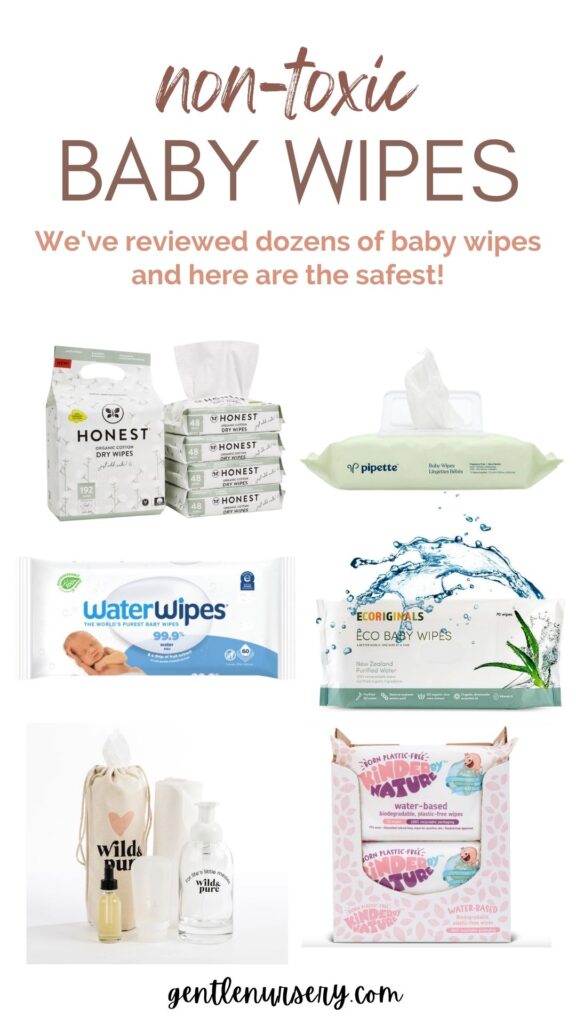

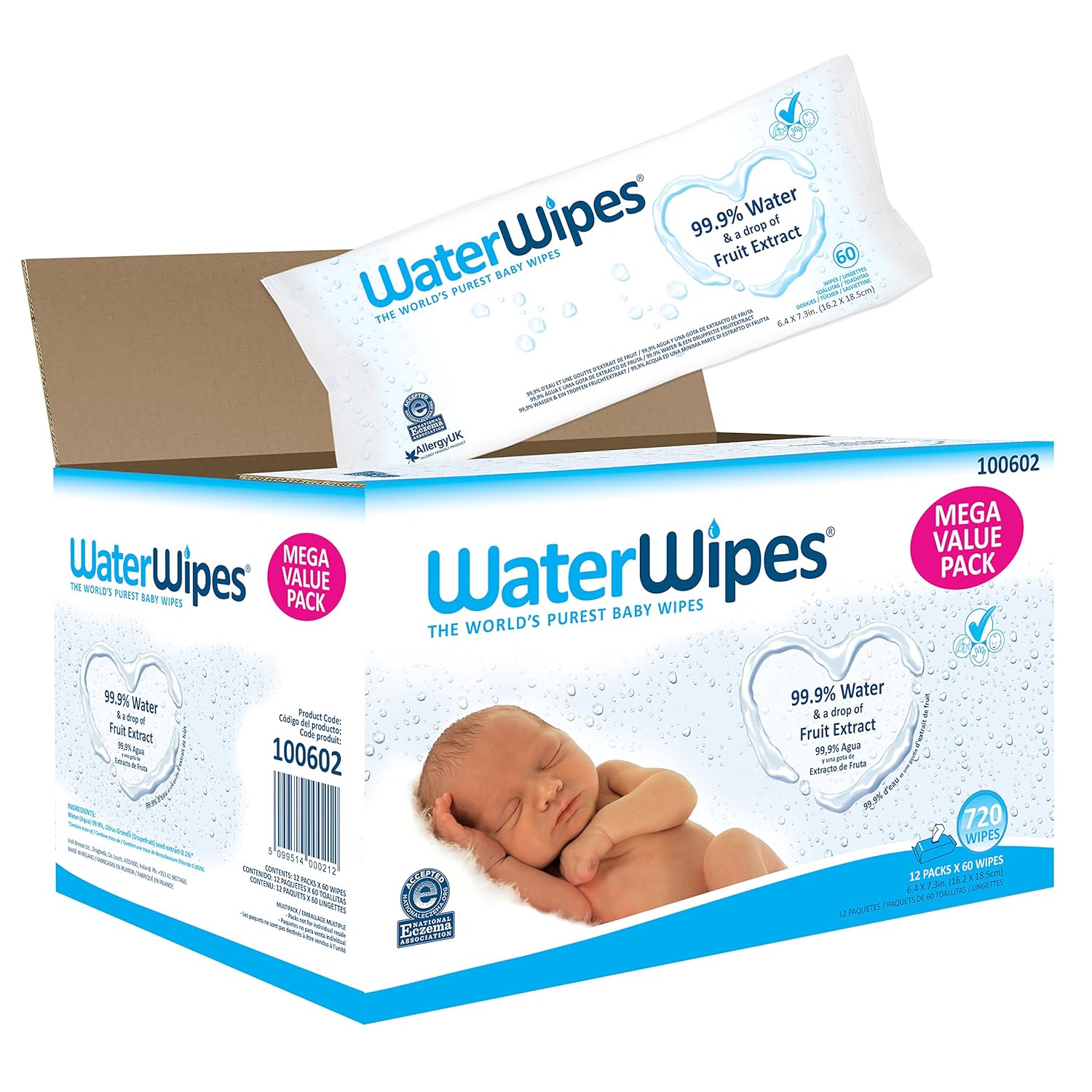




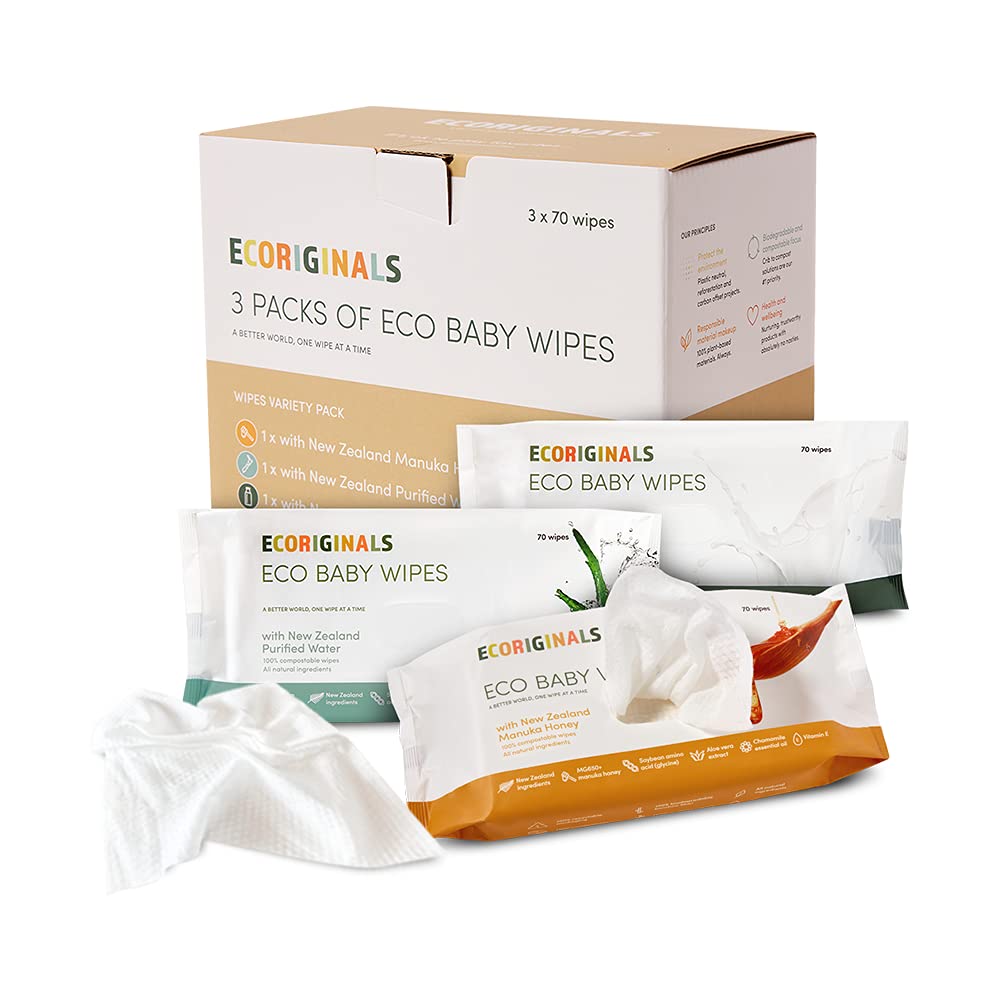

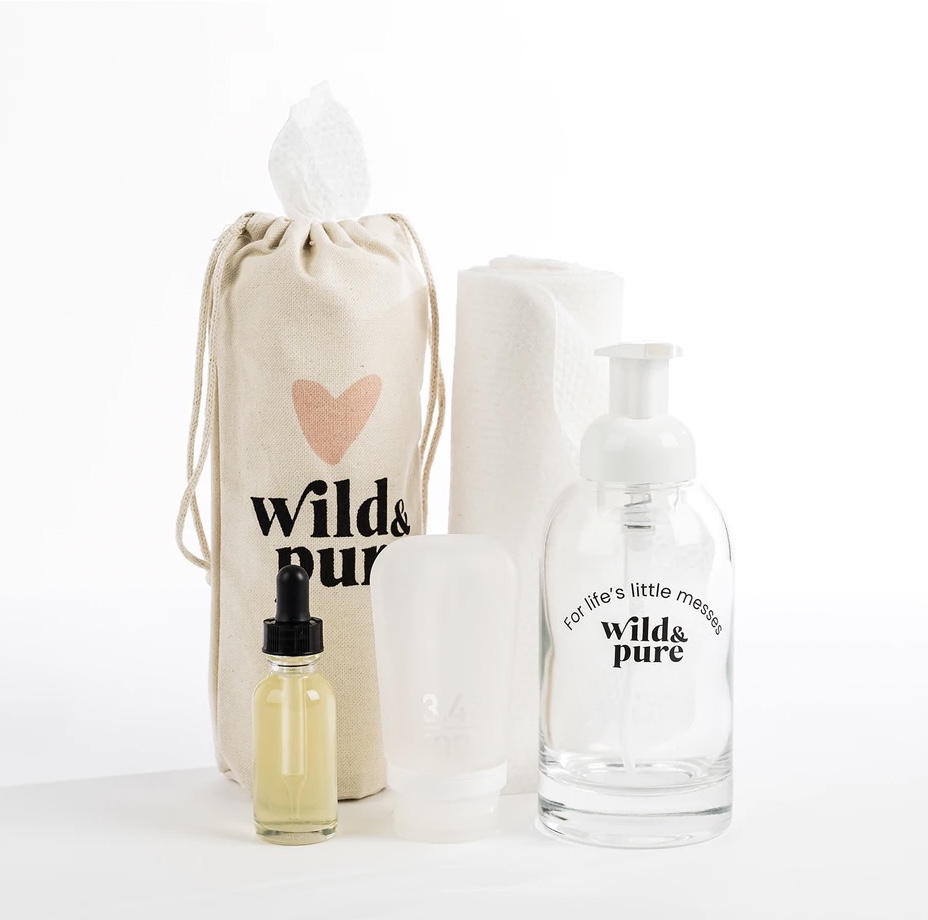
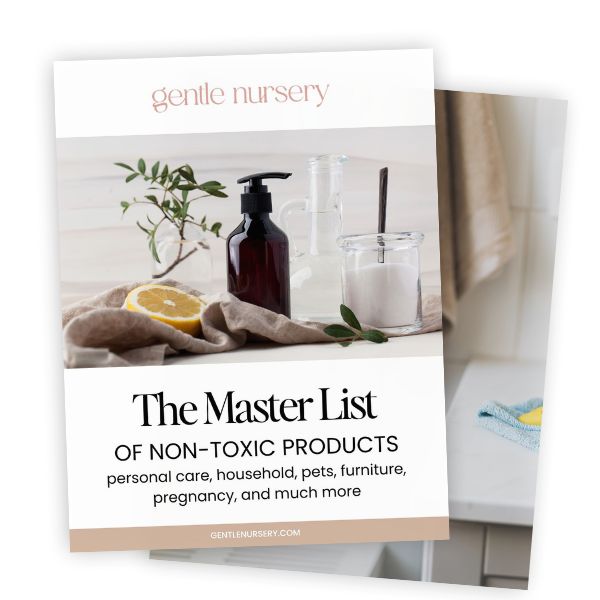




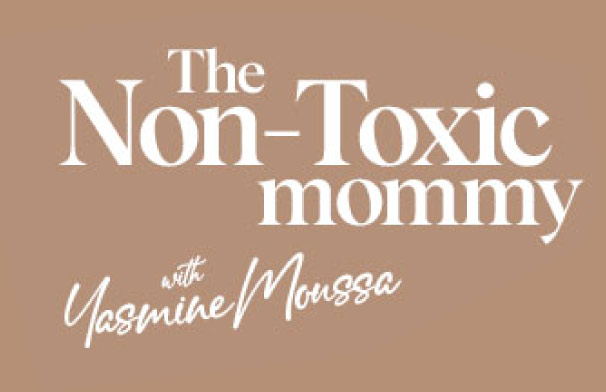



Are there any flushable wipes that you would recommend for potty training?
Thanks for your summary. However, I’d be careful to recommend anything containing silver ions (like the here described Joonya wipes), because this might cause problems for all of us in the near future. See e.g. this review on potential negative effects https://doi.org/10.3389/fmicb.2021.652863
Hi Anke, thanks for posting this. I am pretty weary of all metals so I will take this into consideration as we are updating this article for 2022. Appreciate you reaching out!
Hi, I’ve heard good things about Simple Trust baby wipes, are you able to do an analysis on this brand?
Can you post the ingredients? I think I couldn’t find them last time I looked.